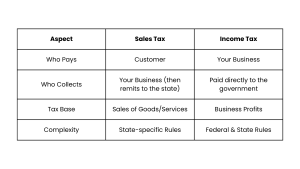Sales Tax vs. Income Tax
What Every Small Business Owner Must Know to Stay Compliant (and Save Money!)
Taxes are a fact of life for small business owners, but understanding the comparison of sales tax vs. income tax can feel like navigating a maze. One wrong turn, and you could face penalties, audits, or even damage to your business’s reputation. So, what’s the difference between these two taxes, and how can you ensure your small business stays compliant without breaking the bank? Let’s break it down in simple terms—so you can focus on growing your business, not stressing over taxes.
At Spyglass Accounting, we specialize in helping small businesses navigate complex tax obligations. Whether you need help with tax preparation services or comprehensive accounting solutions, we’ve got you covered. Let’s dive in!
Sales Tax vs. Income Tax: The Basics
At their core, sales tax and income tax are two entirely different beasts. Here’s the key distinction:
- Sales Tax: A tax on the sale of goods or services, collected from customers and remitted to the state.
- Income Tax: A tax on your business’s profits, paid directly to the government (federal and/or state).
While both taxes are unavoidable for most businesses, how they work—and how you handle them—can make or break your bottom line. If you’re unsure where to start, our team at Spyglass Accounting can help you create a tailored tax strategy. Learn more about our services here.
Sales Tax: What Small Businesses Need to Know
Sales tax is a pass-through tax, meaning you collect it from your customers and then remit it to the state. But here’s the catch: sales tax rules vary wildly by state, and keeping up with them can feel like a full-time job.
Key Points About Sales Tax:
State-Specific Rules: Each state sets its own sales tax rates and rules. For example, Texas taxes downloaded software but offers a 20% rate reduction for SaaS products. Meanwhile, Colorado exempts downloadable software from sales tax entirely.
Nexus Determines Obligations: If your business has a physical presence (like an office or employee) or meets economic thresholds in a state, you have “nexus” and must collect sales tax there. The 2018 South Dakota v. Wayfair Supreme Court decision expanded economic nexus rules, making it easier for states to require sales tax collection from out-of-state businesses.
Exemptions and Complexity: Some products or services are exempt from sales tax, and these exemptions vary by state. For instance, custom software might be taxable in one state but exempt in another.
Pro Tip for Small Businesses:
To help you stay compliant across multiple states without drowning in paperwork, our team at Spyglass Accounting can guide you every step of the way.
Income Tax: What Small Businesses Need to Know
Income tax is a direct tax on your business’s profits. Unlike sales tax, which is collected from customers, income tax comes straight out of your pocket.
Key Points About Income Tax:
Federal and State Obligations: All businesses must pay federal income tax, and most states also impose a corporate income tax. However, seven states (like Texas and Washington) don’t have a corporate income tax.
Gross Receipts Taxes: Some states, like Washington and Texas, impose gross receipts taxes instead of (or in addition to) income tax. These taxes are based on total revenue, not profits, which can be a significant cash flow hit for small businesses.
Quarterly Estimated Payments: If you’re self-employed or run a small business, you’ll likely need to make quarterly estimated tax payments to avoid penalties.
Pro Tip for Small Businesses:
Work with a tax professional to identify deductions and credits that can lower your taxable income. For example, expenses like office supplies, travel, and even software subscriptions can often be written off. At Spyglass Accounting, we specialize in helping small businesses maximize deductions and stay compliant. Explore our tax preparation services here.
The Biggest Differences: Sales Tax vs. Income Tax
To make it crystal clear, here’s a quick comparison:
Common Mistakes Small Businesses Make
- Ignoring Nexus Rules: Failing to recognize when your business has nexus in a state can lead to hefty penalties. For example, storing inventory in an Amazon FBA warehouse can create nexus in multiple states.
- Mixing Up Taxes: Some small businesses mistakenly treat sales tax as income or vice versa. Remember: sales tax is collected from customers, while income tax is paid from your profits.
- Missing Deadlines: Late filings or payments can result in fines. Set reminders for quarterly estimated tax payments and sales tax filing deadlines.
If you’re worried about making these mistakes, Spyglass Accounting can help you stay on track with proactive tax planning and compliance support.
How to Stay Compliant (and Save Money)
- Invest in Automation: Tools like TaxJar and Anrok can handle sales tax calculations, filings, and remittances, saving you time and reducing errors.
- Consult a Tax Pro: A tax advisor can help you navigate complex rules, identify deductions, and ensure compliance. At Spyglass Accounting, we offer personalized tax preparation and consulting services to help small businesses thrive. Learn more about how we can help.
- Stay Educated: Tax laws change frequently. Subscribe to resources like Spyglass Accounting Insights to stay updated.
Key Takeaways
- Sales tax is collected from customers and remitted to the state, while income tax is paid directly from your business’s profits.
- Nexus rules determine where you must collect sales tax, and these rules vary by state.
- Income tax obligations include federal and (usually) state taxes, with some states imposing gross receipts taxes.
Final Thoughts
Understanding the difference between sales tax vs. income tax is crucial for small business owners. By staying informed and leveraging the right tools, you can avoid costly mistakes and focus on what really matters—growing your business.
At Spyglass Accounting, we’re here to help you navigate the complexities of taxes and accounting. Whether you need help with tax preparation, bookkeeping, or strategic financial planning, our team is ready to support you. Visit our homepage to learn more about how we can help your business succeed.

